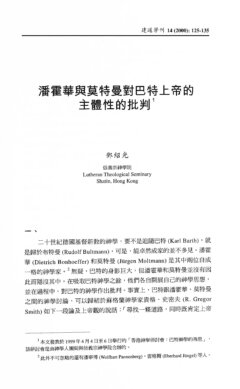潘霍華與莫特曼對巴特上帝的主體性的批判 / 鄧紹光
撮要
巴特對二十世紀新教神學最大的貢獻在於重申上帝的主體性。巴特所了解的上帝的主體性是分為兩層的:第一客體性和第二客體性。一方面,上帝的主體性是以第一客體性的自我關聯中的內在自我啟示為本質的。另方面,上帝的第二客體性乃建基於第一客體性,第二客體性的他者關聯乃上帝在基督裡自由地向他者啟示自己。潘霍華批評巴特以第一客體性為上帝主體自由的本質所在,乃形式而非實質。只有上帝在基督裡走出自己與他者相交,其主體性方才確實具體。然而,潘霍華並沒有進一步討論第二客體性對第一客體性具有建構性的作用。莫特曼追隨潘霍華進而討論第二客體性對第一客體性的建構性作用。他指出上帝就是愛,故容讓自己為與他者關聯而被影響。即是說,在內在三一的原初決定下,經世三一也可以對神聖的內在生命有所塑造。以此,莫特曼把巴特的雙重客體性結構進行修正,將巴特的超越主體轉成辯證主體。
ABSTRACT
Barth’s most important contribution for the Protestant Christianity in the twentieth century is his reclaiming of God’s subjectivity. His understanding of God’s subjectivity is twofold-structured. On one hand, as primary objectivity, God’s subjectivity is essentially his self-relatedness in his self-revelation within himself. On the other hand, as secondary objectivity, which is grounded on his primary objectivity, God’s subjectivity is expressed in relating to the other when He freely reveals Himself to those different from Him. D. Bonhoeffer criticizes such freedom of subjectivity in terms of primary objectivity is formal but not substantial. It is only when God goes out of Himself in Christ that God’s freedom of subjectivity is concretely defined as His relation to the other. However, Bonhoeffer is not involved in the discussion of the reversal influence on the primary objectivity. J. Moltmann follows Bonhoeffer and further argues the relative reversal construction of God’s secondary objectivity. In Moltmann’s terms, God is love so that He allows Himself to be influenced by His relation to the other. That is, on the basis of the primary determination of the immanent Trinity, God’s economic Trinity allows determination of His inner divine life. In this way, Moltmann stays within Barth’s twofold structure but transforms Barth’s understanding of God’s subjectivity as transcendent I-ness to dialectical I-ness.
原載於《建道學刊》14期(2000年7月),頁123-135。
最新文章
「牧範」與「硬淨」! / 梁國強
2024 年 11 月 1 日
【代院長的話】神學教育的生命迴響 / 高銘謙
2024 年 10 月 1 日
【屬靈導引】屬靈導引—一門失落的藝術 / 董智敏
2024 年 10 月 1 日
编辑精选
從梧州到長洲:建道神學院125年的挑戰與恩典 / 陳智衡
2023 年 10 月 1 日
微小教會的見證/高銘謙
2023 年 6 月 1 日







